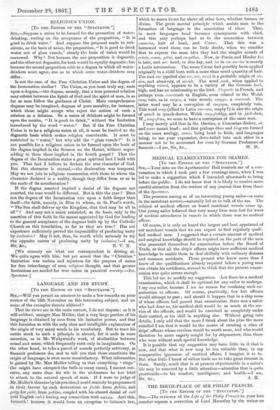LANGUAGE AND ITS STUDY.
[To THE EDITOR OF THE "SPECTATOR."] SIR,—Will you permit an amateur to make a few remarks on your review of the 16th November on this interesting subject, and on some of the examples therein adduced ?
That its views are in the main correct, I do not dispute ; as it is self-evident, mangre Max Midler, that a very large portion of his language is obtained by man from his imitative power, and that this furnishes us with the only clear and intelligible explanation of the origin of very many words in his vocabulary. But to trace his entire stock to such a principle is absurd, for it ends in mere assertion, as in Mr. Wedgwood's work, of similarities between sound and sense, which frequently exist only in imagination. On the other hand, to take a parcel of sounds perfectly arbitrary, as Sanscrit professors do, and to tell you that these constitute the origin of language, is even more unsatisfactory. What information is gained by Mr. Max Muller telling US that everything " rings " (he might have excepted the bells in many cases), I cannot con- ceive, any more than his wit in the nicknames he has tried to attach to the natural speech of man. If I were to judge of Mr. Miiller's theories by his practice, I could scarcely be prepossessed in their favour by such derivations as feeble from fiebilis, and peg for petit, from petiim, coupled with his absurd denial of call (old English cale) having any connection with xaXsor. And this, forsooth ! because it would form an exception to Grimm's law, which he seems to set far above all other laws, whether human or divine. The great mental principle which assists man in the formation of language is the association of ideas. Thus, in most languages head becomes synonymous with chief, and this may perhaps lead us to the connection between cawries, hair of head, and Omar. That this was a borrowed word there can be little doubt, when we consider that to express the same idea they had the simpler sounds of minis, coma, piles, and ca-piles. Now, in Persia and Iiindee LTS is hair, and stir head, to this day, and lea in cm-stir-lea is merely a Latin termination. The name Cmsar had possibly been applied originally to a child born with a more than usual quantity of hair. The root sta. (spelled also sir, ser, seer) is a probable origin of sir, sire, and abusively, of sirrah. The word cock, when applied to anything raised, appears to be a variety of the German hock, high, and has no relationship to the bird. Coquette in French, and perhaps even cox-comb in English, seem related to the Welsh coeg, vain, as in coeyen, a vain wench, coegyn, a coxcomb. The latter word may be a corruption of coegsym, completely vain. This word coeg (allied to Latin vac-uus, empty?) is also the origin of quack in quack-doctor, Welsh coeg-feddyy, and in jack-claw, W., coeg-frau,ive seem to have a corruption of the same root.
I may merely add that in the ()NULL'', a Caucasian dialect, sir and essur meant head ; and that perhaps khan and king are formed on the same analogy, ceaun being head in Irish, and languages being, to use your expression, dove-tailed into each other in a manner not to be accounted for even by German Professors of Sanscrit.—I am, Sir, &c., W. D.






























 Previous page
Previous page